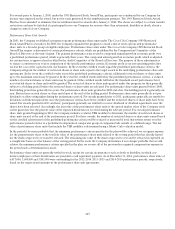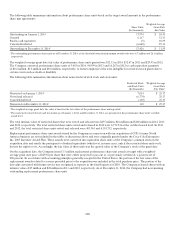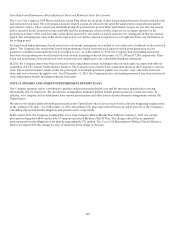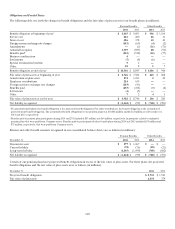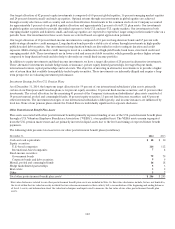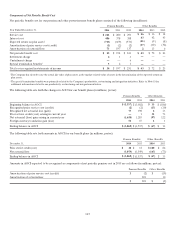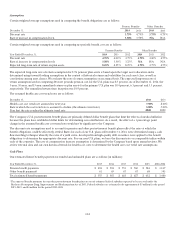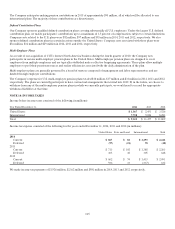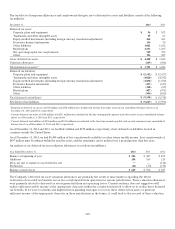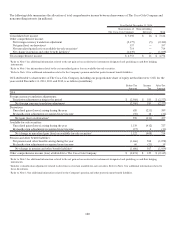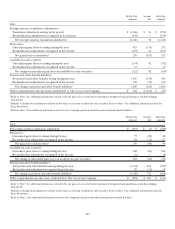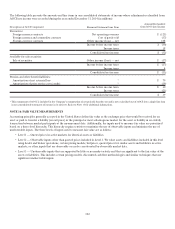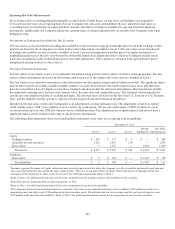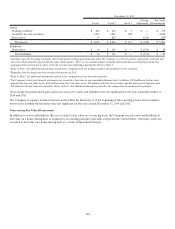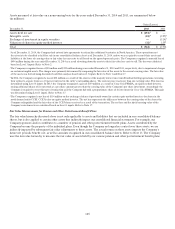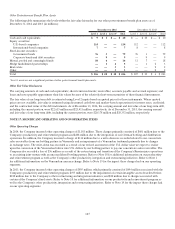Coca Cola 2014 Annual Report Download - page 119
Download and view the complete annual report
Please find page 119 of the 2014 Coca Cola annual report below. You can navigate through the pages in the report by either clicking on the pages listed below, or by using the keyword search tool below to find specific information within the annual report.
117
Our effective tax rate reflects the tax benefits of having significant operations outside the United States, which are generally taxed
at rates lower than the U.S. statutory rate of 35 percent. As a result of employment actions and capital investments made by the
Company, certain tax jurisdictions provide income tax incentive grants, including Brazil, Costa Rica, Singapore and Swaziland. The
terms of these grants expire from 2016 to 2023. We anticipate that we will be able to extend or renew the grants in these locations.
Tax incentive grants favorably impacted our income tax expense by $265 million, $279 million and $280 million for the years ended
December 31, 2014, 2013 and 2012, respectively. In addition, our effective tax rate reflects the benefits of having significant earnings
generated in investments accounted for under the equity method of accounting, which are generally taxed at rates lower than the U.S.
statutory rate.
The Company or one of its subsidiaries files income tax returns in the U.S. federal jurisdiction and various state and foreign
jurisdictions. U.S. tax authorities have completed their federal income tax examinations for all years prior to 2005. With respect to
state and local jurisdictions and countries outside the United States, with limited exceptions, the Company and its subsidiaries are
no longer subject to income tax audits for years before 2002. For U.S. federal and state tax purposes, the net operating losses and tax
credit carryovers acquired in connection with our acquisition of CCE’s former North America business that were generated between
the years of 1990 through 2010 are subject to adjustments until the year in which they are actually utilized is no longer subject to
examination. Although the outcome of tax audits is always uncertain, the Company believes that adequate amounts of tax, including
interest and penalties, have been provided for any adjustments that are expected to result from those years.
As of December 31, 2014, the gross amount of unrecognized tax benefits was $211 million. If the Company were to prevail on all
uncertain tax positions, the net effect would be a benefit to the Company’s effective tax rate of $173 million, exclusive of any benefits
related to interest and penalties. The remaining $38 million, which was recorded as a deferred tax asset, primarily represents tax
benefits that would be received in different tax jurisdictions in the event the Company did not prevail on all uncertain tax positions.
A reconciliation of the changes in the gross balance of unrecognized tax benefit amounts is as follows (in millions):
Year Ended December 31, 2014 2013 2012
Beginning balance of unrecognized tax benefits $ 230 $ 302 $ 320
Increases related to prior period tax positions 13 1 69
Decreases related to prior period tax positions (2) (7) (15)
Increases related to current period tax positions 11 8 23
Decreases related to settlements with taxing authorities (5) (4)
(45)
Reductions as a result of a lapse of the applicable statute of limitations (32) (59) (36)
Increases (decreases) from effects of foreign currency exchange rates (4) (11) (14)
Ending balance of unrecognized tax benefits $ 211 $ 230 $ 302
The Company recognizes accrued interest and penalties related to unrecognized tax benefits in income tax expense. The Company had
$113 million, $105 million and $113 million in interest and penalties related to unrecognized tax benefits accrued as of December 31,
2014, 2013 and 2012, respectively. Of these amounts, $8 million of expense, $8 million of benefit and $33 million of expense were
recognized through income tax expense in 2014, 2013 and 2012, respectively. If the Company were to prevail on all uncertain tax
positions, the reversal of this accrual would also be a benefit to the Company’s effective tax rate.
It is expected that the amount of unrecognized tax benefits will change in the next 12 months; however, we do not expect the change to
have a significant impact on our consolidated statements of income or consolidated balance sheets. These changes may be the result
of settlements of ongoing audits, statute of limitations expiring or final settlements in transfer pricing matters that are the subject of
litigation. At this time, an estimate of the range of the reasonably possible outcomes cannot be made.
As of December 31, 2014, undistributed earnings of the Company’s foreign subsidiaries amounted to $33.3 billion. Those earnings are
considered to be indefinitely reinvested and, accordingly, no U.S. federal and state income taxes have been provided thereon. Upon
distribution of those earnings in the form of dividends or otherwise, the Company would be subject to both U.S. income taxes (subject
to an adjustment for foreign tax credits) and withholding taxes payable to the various foreign countries. Determination of the amount
of unrecognized deferred U.S. income tax liability is not practicable because of the complexities associated with its hypothetical
calculation; however, unrecognized foreign tax credits would be available to reduce a portion of the U.S. tax liability.


